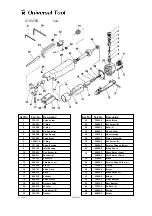
Personal Safety Equipment
Use - Safety Glasses
Yes
Use - Safety Gloves
Use - Safety Boots
Use - Breathing Masks
Use - Ear Protectors
Manufacturer/Supplier
Product Type
RPM
Cycles Per Min
Model No/Nos
Serial No
Product Nett Weight
lbs
Kg
Recommended Use Of
Balancer Or Support
Recommended Hose Bore
Size - Minimum
Recommended Max.
Hose Length
Ins
M/M
Ft
M
No
Page No 1
Saw
UT8920B
1.32
0.6
3/8
10
30
10
10,000
Includes - Foreseen Use, Work Stations, Putting Into Service, Operating,
Dismantling, Assembly and Safety Rules
Operator Instructions
Important
Read these instructions carefully before installing, operating,
servicing or repairing this tool. Keep these instructions in a safe
accessible place.
Universal Air Tool Company Limited
Unit 8
Lane End Industrial Park
High Wycombe
Bucks
HP14 3BY
Work Stations
The tool should only be used as a handheld hand operated tool. It is
always recommended that the tool is used when standing on the solid
floor. It can be used in other positions but before any such use, the
operator must be in a secure position having a firm grip and footing.
Foreseen Use Of The Tool
This tool is designed for the purpose of sawing materials when fitted
with the saw blades supplied by, or recommended by the
manufacturers. Do not use the tool for any other purpose than that
specified without consulting the manufacturer or the manufacturers
authorised representative. Do not modify the tool even for intended
use as a saw.
Putting Into Service
Air Supply
Use a clean lubricated
air supply that will give
a measured air pres-
sure at the tool of 90
p.s.i./6.3 bar when the
tool is running with the
trigger fully depressed.
Use recommended
hose size and length. It
is recommended that
the tool is connected to
the air supply as shown
Tel No
Fax No
(01494) 883300
(01494) 883237
Vibration Level
Test Method
Tested in accordance with ISO
standards 8662 Parts 1 & 12
22.6
Noise Level
Sound Pressure Level 79.0 dB(A)
Test Method
Tested in accordance with Pneurop
test code PN8NTC1 and ISO Standard 3744
in figure 1. Do not connect the tool to the air line system without
incorporating an easy to reach and operate air shut off valve. The air
supply should be lubricated. It is strongly recommended that an air
filter, regulator, lubricator (FRL) is used as shown in Figure 1 as this will
supply clean, lubricated air at the correct pressure to the tool. Details
of such equipment can be obtained from your supplier. If such
equipment is not used then the tool should be lubricated by shutting
off the air supply to the tool, depressurising the line by pressing the
trigger on the tool. Disconnect the air line and pour into the intake
bushing a teaspoonful (5ml) of a suitable pneumatic motor lubricating
oil preferably incorporating a rust inhibitor. Reconnect tool to air
supply and run tool slowly for a few seconds to allow air to circulate
the oil. If tool is used frequently lubricate on daily basis and if tool starts
to slow or lose power.
It is recommended that the air pressure at the tool whilst the tool is
running is 90 p.s.i./6.3 bar. The tool can run at lower and higher
pressures with the maximum permitted working air pressure of 100
p.s.i./7.0 bar.
Metres / Sec²
Air Pressure
Recommended Working
6.3
bar
90
PSI
Recommended Minimum
n/a
bar
n/a
PSI
Maximum
7
bar
100
PSI






















